
Apple
Apples are fruits that come from a small tree that can reach about 25 feet in height and a crown spread of about 25 feet.
They have oval shaped leaves, a brown bark and a mature trunk can reach 24 inches in diameter.
The fruits are green to yellow to red, or a mixture.
They were first mentioned by Greeks and Romans in the 3rd century BC but are now produced by more than 60 countries worldwide, producing more than 1000 metric tons.
The common varieties are the Red Delicious, Golden Delicious, Granny Smith, Fuji and Gala.

Iranian Apple
The apples produced in Iran have various shapes and colors. They have a round shape with a cavity at the top; some of them are closely rounded and the others have a conic shape. Moreover, some of Iranian apple fruits have knob-like lobes at the bottom of the calyx.
The most famous Iranian apples are:
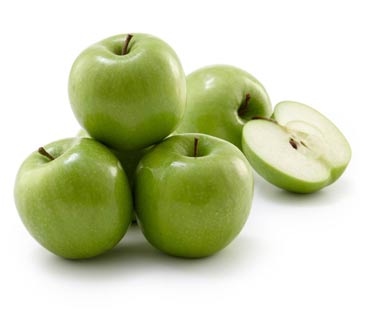
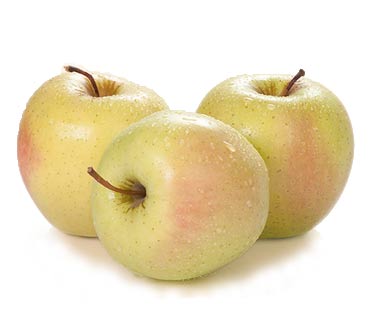
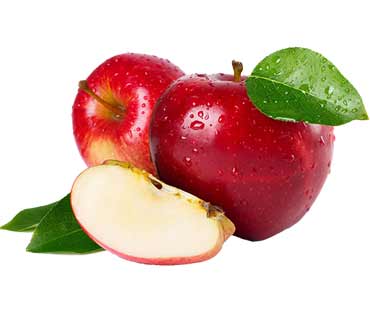
Granny Smith Apple
Granny Smith apples are special for the balanced tastes of sweetness and sourness and were first discovered by Maria Ann Smith in Australia. These apples have a distinguishable bright-green color and stay fresh during the transportation. Also, because of their thick skin, Granny Smith apples can be stored in cold storage for about six months. Considering its special taste, these apples are mostly used in desserts, pies and for making a unique sauce.
-Annual production in Iran: More than 100,000 MT
-Main production areas: ALBORZ, TEHRAN, ZAJAN provinces.
-Skin color: Complete Green
-Inside color: White
-Taste: Sweet & Sour
-Season: October to March
-Recommended transit temperature: (-1) to 4 C
-Desired transit humidity percent: 90 to 95
Golden Delicious Apple
Golden Delicious is another apple type which in comparison to Red Delicious apples is a little sweeter. This apple type is juicy and has a crispy texture. Regarding its shape, Golden Delicious is fatter and rounder than Red Delicious apple type. Also, Golden Delicious apples are mostly used for baking, making apple sauce and especially salads because they have a stable texture and do not turn brown quickly.
-Annual production in Iran: More than 500,000 MT
-Main production areas: TEHRAN, AZERBAIJAN, KHORASAN, ISFAHAN, and ALBORZ provinces.
-Skin color: Complete Yellow
-Inside color: White
-Taste: Sweet
-Season: September to Jun
-Recommended transit temperature: (-1) to 4 C
-Desired transit humidity percent: 90 to 95
Red Delicious Apple
This beautiful apple type has a deep red color. In contrast to their beautiful and attractive appearance, the apples flavor is rather mild and insipid. The skin of this apple type is thick and has a bitter taste, but the inside eatable part has a crispy texture. In comparison to the rounder apple types, the Red Delicious apples have thinner shape.
-Annual production in Iran: More than 1,500,000 MT
-Main production areas: TEHRAN, AZERBAIJAN, KHORASAN, ISFAHAN, FARS and ALBORZ provinces.
-Skin color: Complete Red
-Inside color: White
-Taste: Sweet
-Season: October to Jun
-Recommended transit temperature: (-1) to 4 C
-Desired transit humidity percent: 90 to 95
Our ranking in the world

• Iran with 2100k tons of production (3% of worldwide production) is the sixth in the producers ranking and with the 0.4% of export share is located in 23th ranking of exporters.

• Iran is ranked fourth in Asia as a producer of Apple.
Main production places
The apple is growing and cultivating in many different places around country but the most important areas those are famous in pomegranate cultivating are AZERBAIJAN, ISFAHAN, KHORASAN, TEHRAN, ALBORZ and FARS provinces.
Nutritional value and Benefits
Apples are one of the most popular fruits — and for good reason.
They're an exceptionally healthy fruit with many research-backed benefits.

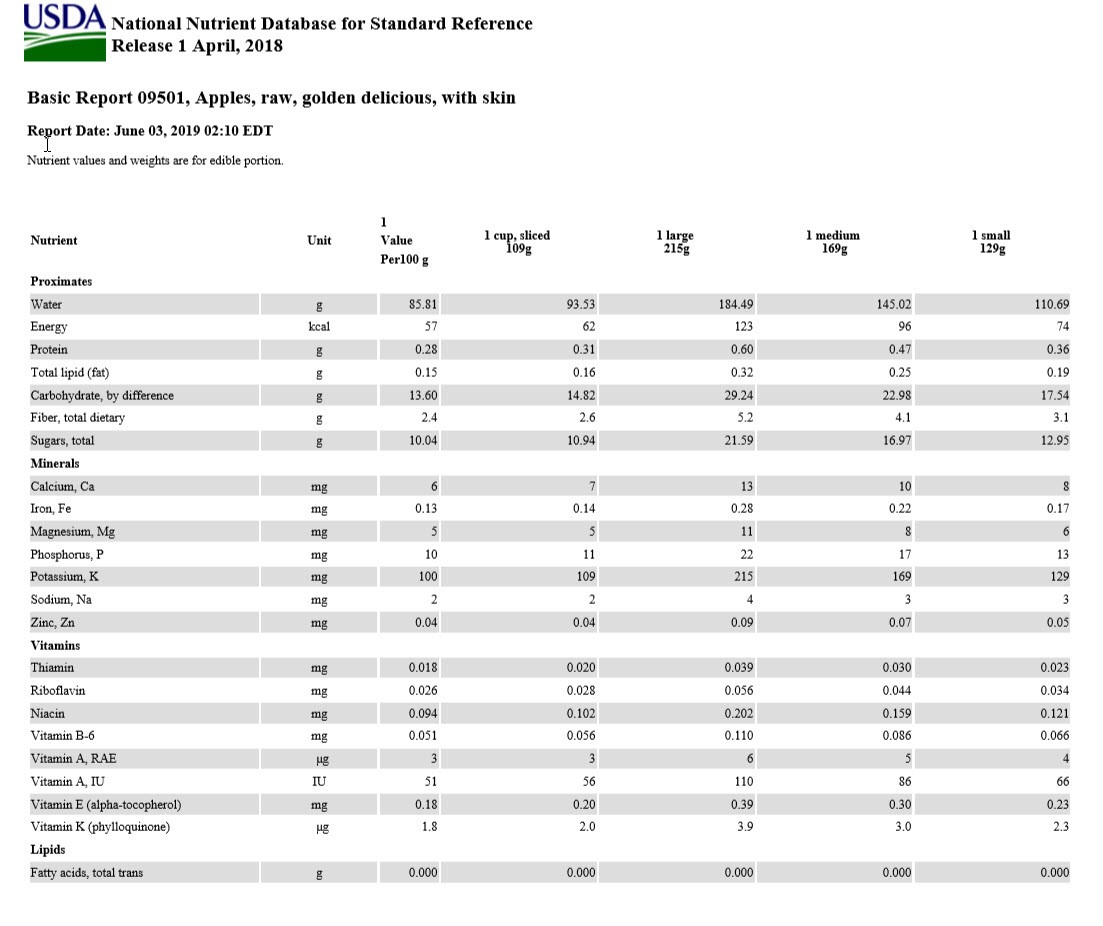
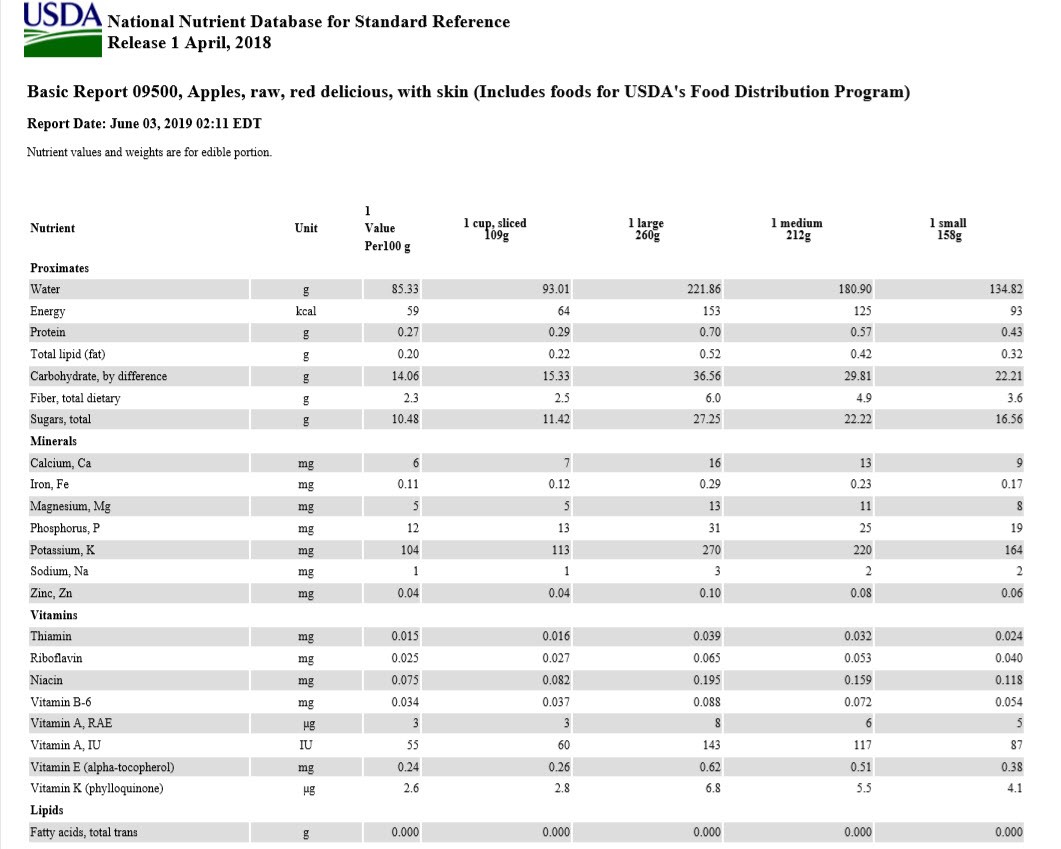
Apples May Be Good for Your Heart
Apples have been linked to a lower risk of heart disease. One reason may be that apples contain soluble fiber — the kind that can help lower your blood cholesterol levels. They also contain polyphenols, which have antioxidant effects. Many of these are concentrated in the peel. One of these polyphenols is the flavonoid epicatechin, which may lower blood pressure. An analysis of studies found that high intakes of flavonoids were linked to a 20% lower risk of stroke. Flavonoids can help prevent heart disease by lowering blood pressure, reducing “bad” LDL oxidation, and acting as antioxidants. Another study is comparing the effects of eating an apple a day to taking statins — a class of drugs known to lower cholesterol — concluded that apples would be almost as effective at reducing death from heart disease as the drugs. However, since this was not a controlled trial, findings must be taken with a grain of salt. Another study linked consuming white-fleshed fruits and vegetables, such as apples and pears, to a reduced risk of stroke. For every 25 grams — about 1/5 cup of apple slices — consumed, the risk of stroke decreased by 9%.
SUMMARY Apples promote heart health in several ways. They're high in soluble fiber, which helps lower cholesterol. They also have polyphenols, which are linked to lower blood pressure and stroke risk.
Apples May Be Good for Weight Loss
Apples are high in fiber and water — two qualities that make them filling. In one study, people who ate apple slices before a meal felt fuller than those who consumed applesauce, apple juice, or no apple products. In the same study, those who started their meal with apple slices also ate an average of 200 fewer calories than those who didn't. In another 10-week study in 50 overweight women, participants who ate apples lost an average of 2 pounds (1 kg) and ate fewer calories overall, compared to those who ate oat cookies with a similar calorie and fiber content. Researchers think that apples are more filling because they’re less energy-dense, yet still deliver fiber and volume. Furthermore, some natural compounds in them may promote weight loss. A study in obese mice found that those given a supplement of ground apples and apple juice concentrate lost more weight and had lower levels of "bad" LDL cholesterol, triglycerides, and total cholesterol than the control group.
SUMMARY Apples may aid weight loss in several ways. They're also particularly filling due to their high fiber content.
Apples May Help Protect Your Brain
Most research focuses on apple peel and flesh. However, apple juice may have benefits for age-related mental decline. In animal studies, juice concentrate reduced harmful reactive oxygen species (ROS) in brain tissue and minimized mental decline. Apple juice may help preserve acetylcholine, a neurotransmitter that can decline with age. Low levels of acetylcholine are linked to Alzheimer's disease. Similarly, researchers who fed elderly rats whole apples found that a marker of the rats' memory was restored to the level of younger rats. That said, whole apples contain the same compounds as apple juice — and it is always a healthier choice to eat your fruit whole.
SUMMARY According to animal studies, apple juice may help prevent the decline of neurotransmitters that are involved in memory.
Apples May Have Prebiotic Effects and Promote Good Gut Bacteria
Apples contain pectin, a type of fiber that acts as a prebiotic. This means it feeds the good bacteria in your gut. Your small intestine doesn't absorb fiber during digestion. Instead, it goes to your colon, where it can promote the growth of good bacteria. It also turns into other helpful compounds that circulate back through your body. New research suggests that this may be the reason behind some of the protective effects of apples against obesity, diabetes type 2, and heart disease.
SUMMARY The type of fiber in apples feeds good bacteria and may be the reason they protect against obesity, heart disease, and diabetes type 2.
Apples Contain Compounds That Can Help Fight Asthma
Antioxidant-rich apples may help protect your lungs from oxidative damage. A large study in more than 68,000 women found that those who ate the most apples had the lowest risk of asthma. Eating about 15% of a large apple per day was linked to a 10% lower risk of this condition. Apple skin contains the flavonoid quercetin, which can help regulate the immune system and reduce inflammation. These are two ways in which it may affect asthma and allergic reactions.
SUMMARY Apples contain antioxidant and anti-inflammatory compounds that may help regulate immune responses and protect against asthma.
Substances in Apples May Help Prevent Cancer
Test-tube studies have shown a link between plant compounds in apples and a lower risk of cancer. Additionally, one study in women reported that eating apples was linked to lower rates of death from cancer. Scientists believe that their antioxidant and anti-inflammatory effects may be responsible for their potential cancer-preventive effects.
SUMMARY Apples have several naturally occurring compounds that may help fight cancer. Observational studies have linked them to a lower risk of cancer and death from cancer.
Apples May Be Good for Bone Health
Eating fruit is linked to higher bone density, which is a marker of bone health. Researchers believe that the antioxidant and anti-inflammatory compounds in fruit may help promote bone density and strength. Some studies show that apples, specifically, may positively affect bone health. In one study, women ate a meal that either included fresh apples, peeled apples, applesauce, or no apple products. Those who ate apples lost less calcium from their bodies than the control group.
SUMMARY The antioxidant and anti-inflammatory compounds in apples may promote bone health. What’s more, eating fruit may help preserve bone mass as you age.
Apples May Protect Against Stomach Injury from NSAIDs
The class of painkillers known as nonsteroidal anti-inflammatory drugs (NSAIDs) can injure the lining of your stomach. A study in test tubes and rats found that freeze-dried apple extract helped protect stomach cells from injury due to NSAIDs. Two plant compounds in apples — chlorogenic acid and catechin — are thought to be particularly helpful. However, research in humans is needed to confirm these results.
SUMMARY Apples contain compounds that may help protect your stomach lining from injury due to NSAID painkillers.
Apples are linked to a Lower Risk of Diabetes
Several studies have linked eating apples to a lower risk of type 2 diabetes. In one large study, eating an apple a day was linked to a 28% lower risk of type 2 diabetes, compared to not eating any apples. Even eating just a few apples per week had a similarly protective effect. It's possible that the polyphenols in apples help prevent tissue damage to beta cells in your pancreas. Beta cells produce insulin in your body and are often damaged in people with type 2 diabetes.
SUMMARY Eating apples is linked to a lower risk of type 2 diabetes. This is possibly due to their polyphenol antioxidant content.
Apples are incredibly good for you, and eating them is linked to a lower risk of many major diseases, including diabetes and cancer.
What’s more, its soluble fiber content may promote weight loss and gut health.
A medium apple equals 1.5 cups of fruit — which is 3/4 of the 2-cup daily recommendation for fruit.
For the greatest benefits, eat the whole fruit — both skin and flesh.
Packaging and Shipping
The Smile fruit Company is packaging and exporting apples of exceptional quality and great taste all through Iran. Our packing system for Apples converges to the optimum point of parameters:
•Ventilating each fruit’s peel entirely
•Decreasing the weight by keeping the strength
•Accessibility for Forklift and hand-jack from all sides
•Implementing recyclable and biodegradable materials
•Securing fruits from degradation due to one point contact
•Cross ventilating of the boxes and the pallets in a uniform temperature
•Use of Hygiene used materials pure from any unwanted contamination
As a part of belief in environmental friendly practice, EDMANFRUIT’s boxes and pallets are made from recyclable and fast biodegradable materials. These boxes are light but solid with high stacking load tolerance (500 kg) which is surely tick their service condition in our packing system.

